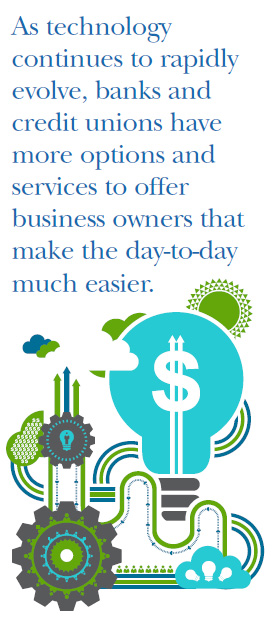
It’s no secret that business is strong in Cobb County. Home to several Fortune 500 corporate offices and headquarters including The Home Depot, Genuine Parts Company, Lockheed Martin and GE, big businesses have taken advantage of all that the metro area has to offer. But it’s not only the big dogs who benefit from living and working in Cobb: According to the Kauffman Foundation, in 2012, Georgia had the highest entrepreneurial activity as well as the largest increase in entrepreneurial activity. NerdWallet also voted Atlanta the No. 1 spot on their “Best Cities to Start a Business” list, which debuted in April.
For businesses to thrive they must have equally strong financing options, and Cobb’s banks and credit unions work to provide local businesses with the best services to facilitate success. When it comes to starting and remaining a successful business, there are many variables to consider, and from loans and deposit accounts to merchant services and even business plans, Cobb’s financial institutions have you covered.
In the Beginning
According to Rodney Grizzle, assistant vice president of member business lending at LGE Community Credit Union, being appropriately capitalized during the first three years of operation is key for growing—or beginning—a company. A common misconception in recent years is that loans are harder to get in today’s economy, but as long as you approach a lender with a solid business plan and a strong understanding of what it takes to run a business in your field, you’re on the right track.
“There is no price tag that can be placed on the value of having a well-written business plan,” says LGE Retail Business Analyst Heather Bedell. “It will not only help you as the business owner to develop and focus your own energy, but a well-written plan will communicate your vision to others in the financial world who can help your business succeed by meeting its goals along the way.”
Each customer will have their own unique needs and financial hurdles to overcome, and James Pope, president and CEO of KeyWorth Bank, advises them to turn to their banker. “We encourage any applicant to put together a three-year business plan and present that to the banker and let them review it,” he says. “If there are banking services needed, whether it be deposit accounts or loans, then we will work with the borrower to structure and design those kinds of products that will help them with their business venture. I think a good plan is the start.”
Options for Small Businesses
The financial services industry is evolving, which is creating more innovative options tailor-made for small businesses, according to Grizzle. “Small businesses should talk to their lenders or the financial institutions to learn about all the financial tools available to them, and then select only those that will meet their specific needs and make sense for their business,” he says. “Some options may include traditional lines of credit, commercial mortgages and short-term installment loans.”
Small Business Association (SBA) loans provide attractive options for small business owners and remain an avenue most bankers recommend to all their business customers. For example, if a project is $1 million, the borrower is required to put down 10 percent and they can finance 90 percent, which is divided such that 50 percent is done by the bank and 40 is done by the SBA. This is great for both bank and borrower and gives attractive terms without requiring borrowers to put a large amount of money down.
Of course, not every type of business or business owner will need the same type of loan, and several other options exist to fit individual needs. “The 7A is not an SBA-funded loan, but a guaranteed loan,” explains Pope. “The bank makes the loan and the SBA guarantees generally 75 percent of any loss, should the loan incur a loss. Those are very attractive especially when the borrower is starting out or is a little weaker financially than the traditional underwriting that the bank would want. The guarantee of the SBA helps to mitigate some of that financial weakness and would enable the bank to do a loan that they otherwise might not be able to do.”
In addition to the SBA 7A and 504 programs, “There is also a similar program through the Georgia Department of Community Affairs that is administered very well but it is subject to eligibility of the local community,” says Mike Henderson, senior vice president and president of the Cobb division at Metro Bank. “We have had very good results with both.” He adds that underwriting departments look at cash flow and long-term payment abilities, so having good financial reporting allows everything to go smoothly.
Preparing Financially
For new and aspiring entrepreneurs, starting a business requires a lot of preparation. Everything from your personal finances to contingency plans must be taken into consideration. “A good personal credit history is a must,” says Terri Guthrie, chief lending officer of First Landmark Bank. “Even though you may be looking for a business loan, banks will look at your personal financial reputation and habits in conjunction with your business plan and company financials.” She also advises new business owners to be prepared for cash up-front requirements and to personally guarantee any loans you may need. “Have a very good capital position or access to capital. Cash is king,” adds Henderson.
While it is standard to prepare for the worst, businesses should also prepare for growth and all it involves. With expansion comes a need for further resources and, as a result, more capital. “Businesses should understand the effect revenues have on cash flow,” advises Grizzle. “Most business owners equate sales to profitability, however, increased sales require additional capital to support the sales growth. Projecting the cash flow cycle on a new product or service is essential to the financial health of any business.”
In Market President Jeff Higginbotham’s experience, business owners need to keep proper capitalization in mind. “We help clients with their capital structures—either advising on short-term credit facilities that are needed—or if a company is over capitalized, ideas on how to put that capital to work for them,” he says. Interest risk protection is another topic that needs to be evaluated, and often re-evaluated, whenever loans are involved.
Pope encourages developing a three-year forecast for your business to use as a resource for measuring progress. “Knowledgeable, experienced bankers can review those budgets and forecasts and give feedback to customers,” says Pope. “We serve as a sounding board.”
Explore Your Options
 As technology continues to rapidly evolve, banks and credit unions have more options and services to offer business owners that make the day-to-day much easier. At KeyWorth, Pope tells business customers to take advantages of their remote deposit capture scanners, which are placed in the business to scan checks from customers. “It’s very efficient, very convenient for that business—especially small businesses that just can’t take the time to leave their business and take an hour or two and come to the bank every day,” says Pope.
As technology continues to rapidly evolve, banks and credit unions have more options and services to offer business owners that make the day-to-day much easier. At KeyWorth, Pope tells business customers to take advantages of their remote deposit capture scanners, which are placed in the business to scan checks from customers. “It’s very efficient, very convenient for that business—especially small businesses that just can’t take the time to leave their business and take an hour or two and come to the bank every day,” says Pope.
Sylvia Hamby of Community Bank of the South is proud to offer customers lines of credit for cash flow purposes as well as facility construction loans to help them tackle whatever situation should arise in their business lives. “We can assist with business succession plans and ownership buyouts. Most importantly, each of our business customers has a local account officer that provides personal attention, advice and assistance in managing their business,” she says.
As all business owners know, time is money. “Businesses with higher level electronic banking needs and conveniences often select other treasury management services such as remote deposit capture, ACH electronic transfers of funds, wire transfers, online bill payment and electronic bank statements,” says Guthrie. “Each of these offer time- and money-saving opportunities—essential to small business owners.”
As a business owner, it is important to have a good relationship with your financial institution in the best interest of your business and investments. “Over the past several years, the economic conditions have created an opportunity for viable companies to obtain financing,” says Grizzle. “A relationship approach with a financial institution is a valuable resource for your business opportunities.” If you’ve been thinking about starting your own business or know someone who has harbored that dream for a long time, Cobb County has ample resources to make that vision a reality. So harness your skill, craft or trade, map out your business plan and assemble your team of trusted partners—which should definitely include your finacial institution.




















